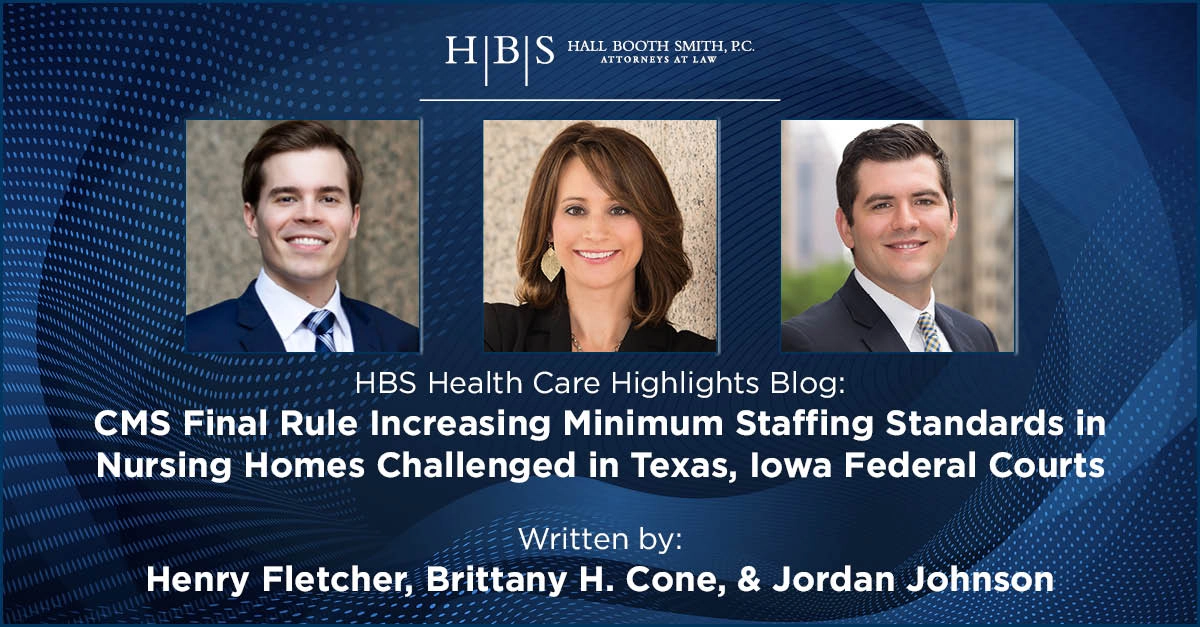
CMS Final Rule Increasing Minimum Staffing Standards in Nursing Homes Challenged in Texas, Iowa Federal Courts
Background
On April 22, 2024, the Centers for Medicare & Medicaid Services (CMS) issued a final ruling on the Minimum Staffing Standards for Long-Term Care (LTC) Facilities as conditions for their participation in Medicare and Medicaid. Within its ruling, CMS requires a total nurse staffing standard of 3.48 hours per resident day (HPRD), which must include at least 0.55 HPRD of direct registered nurse (RN) care and 2.45 HPRD of direct nurse aid care. As for the remaining 0.48 HPRD, facilities may use any combination of nursing staff. Notably, the final rule also introduces a significant change by tripling the longstanding Congressional directive requiring an RN on-site for 8 hours a day, 7 days a week, to now mandating 24/7 RN coverage.
The implementation of the new requirements will take place over a three-year staggered period for non-rural facilities in the following phases:
- Phase 1: Within ninety (90) days of the final rule publication, facilities must meet the facility assessment requirements.
- Phase 2: Within two (2) years of the final rule publication, facilities must meet the 3.48 HPRD total nurse staffing requirement and the 24/7 RN requirement.
- Phase 3: Within three (3) years of the final rule publication, facilities must meet the 0.55 RN and 2.45 NA HPRD requirements.
For rural facilities, implementation will take place over a five-year staggered period in the following phases:
- Phase 1: Within ninety (90) days of the final rule publication, facilities must meet the facility assessment requirements.
- Phase 2: Within three (3) years of the final rule publication, facilities must meet the 3.48 HPRD total nurse staffing requirement and the 24/7 RN requirement.
- Phase 3: Within five (5) years of the final rule publication, facilities must meet the 0.55 RN and 2.45 NA HPRD requirements.
Reaction to Final Rule & Arguments
In response to and in an effort to block the expanded staffing requirements, the Attorney General of Texas filed suit in the United States District Court for the Northern District of Texas, and recently, twenty state Attorney Generals filed suit in the U.S. District Court for the Northern District of Iowa.
In the Texas lawsuit, filed on August 14, 2024, the Texas AG contends that CMS does not have the authority to mandate increased staffing levels in nursing homes. Additionally, the Texas AG asserts that the staffing requirements breach the major questions doctrine, which stipulates that federal agencies cannot enact regulations with substantial economic impact unless explicitly authorized by Congress, and that said breach will force many nursing homes in Texas out of business. In support of the challenge to CMS, the American Hospital Association filed an Amicus Curiae brief contending that the CMS rule oversimplifies the nursing shortage and provides no solution whatsoever.
In the Iowa lawsuit filed on October 8, 2024, twenty (20) state AGs, including Georgia, argue, similar to the Texas case, that CMS overstepped its regulatory authority and the staffing rule is a “flagrant” violation of the major questions doctrine. Furthermore, the state AGs assert that the Final Rule is arbitrary and capricious and abandons the flexible statutory staffing standard that is “sufficient to meet the nursing needs” of each facility’s residents.
In support of its position, CMS points to a broadly worded, catch-all provision that allows the Secretary of Health and Human Services to impose “such other requirements relating to health and safety of residents or relating to the physical facilities thereof as the Secretary may find necessary.” 42 U.S.C. § 1395i-3(d)(4)(B); accord id. 42 U.S.C. § 1396r(d)(4)(B). As of November 20, 2024, CMS has yet to file an answer in response to either lawsuit due to various procedural hurdles.
Impact on the Effective Date and Implementation of the Mandate
Currently, the final ruling aims to implement the staffing requirements mandate in 2026. Depending on developments in both the Texas and Iowa cases, the phase-ins may be delayed or overturned.
Potential Implications
The recent change in presidential administration introduces uncertainty about the direction of HHS and CMS policies, with reports indicating that withdrawing the staffing mandate is a priority for the new administration. However, if the final rule remains intact, many nursing homes will face significant challenges in hiring additional staff to meet the new requirements. While the rule includes phased implementation and provisions for limited, temporary “hardship exemptions,” it largely overlooks the ongoing nationwide shortage of registered nurses, particularly in rural areas. This critical gap may render compliance exceptionally difficult, if not impossible, for many facilities. Additionally, the anticipated additional cost of compliance for the industry, estimated to be roughly $6.5 billion per year according to the American Health Care Association and National Center for Assisted Living, would result in a major financial hardship for nursing homes across the country without sufficient supplemental compensation through increased rates. We expect the future of the staffing rule to become clearer in the coming months as the above-mentioned lawsuits progress and the new administration takes over.
If you need assistance preparing for the implementation of the minimum staffing standard requirements, please reach out to our Aging Services and Health Care teams.
Disclaimer
This material is provided for informational purposes only. It is not intended to constitute legal advice nor does it create a client-lawyer relationship between Hall Booth Smith, P.C. and any recipient. Recipients should consult with counsel before taking any actions based on the information contained within this material. This material may be considered attorney advertising in some jurisdictions. Prior results do not guarantee a similar outcome.
Blog Overview
About the Author
Brittany H. Cone
Partner | Atlanta Office
T: 404.586.6620
E: bcone@hallboothsmith.com
Brittany H. Cone focuses her practice on a wide range of regulatory, administrative, and litigation matters in health care. Certified in Health Care Compliance by the Health Care Compliance Association, she works with providers on the full spectrum of issues they face including Medicare, Medicaid, regulatory compliance, administrative hearings, and appeals.
Jordan Johnson
Partner | Atlanta Office
T: 404.586.6639
E: jjohnson@hallboothsmith.com
Jordan Johnson specializes in aging services and health care matters. His practice features a wide range of regulatory, administrative, and litigation matters, including the full spectrum of issues healthcare providers face such as reimbursement, regulatory compliance, and administrative hearings and appeals.
Henry Fletcher
Attorney at Law | Atlanta Office
T: 678.539.1611
E: hfletcher@hallboothsmith.com
Henry Fletcher focuses his practice on health care and aging services matters.






Leave a comment
You must be logged in to post a comment.